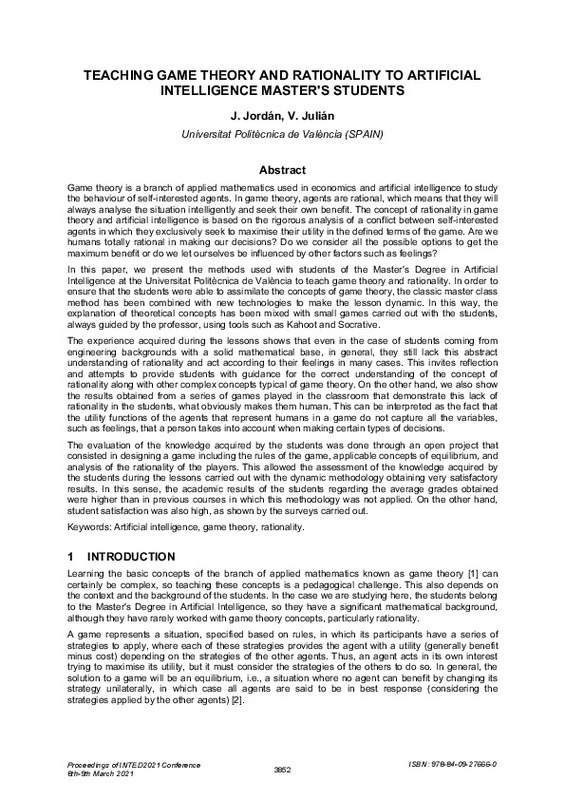JavaScript is disabled for your browser. Some features of this site may not work without it.
Buscar en RiuNet
Listar
Mi cuenta
Estadísticas
Ayuda RiuNet
Admin. UPV
Teaching game theory and rationality to artificial intelligence master's students
Mostrar el registro sencillo del ítem
Ficheros en el ítem
| dc.contributor.author | Jordán, Jaume
|
es_ES |
| dc.contributor.author | Julian Inglada, Vicente Javier
|
es_ES |
| dc.date.accessioned | 2021-11-19T10:56:16Z | |
| dc.date.available | 2021-11-19T10:56:16Z | |
| dc.date.issued | 2021-03-09 | es_ES |
| dc.identifier.isbn | 978-84-09-27666-0 | es_ES |
| dc.identifier.issn | 2340-1079 | es_ES |
| dc.identifier.uri | http://hdl.handle.net/10251/177285 | |
| dc.description.abstract | [EN] Game theory is a branch of applied mathematics used in economics and artificial intelligence to study the behaviour of self-interested agents. In game theory, agents are rational, which means that they will always analyse the situation intelligently and seek their own benefit. The concept of rationality in game theory and artificial intelligence is based on the rigorous analysis of a conflict between self-interested agents in which they exclusively seek to maximise their utility in the defined terms of the game. Are we humans totally rational in making our decisions? Do we consider all the possible options to get the maximum benefit or do we let ourselves be influenced by other factors such as feelings? In this paper, we present the methods used with students of the Master's Degree in Artificial Intelligence at the Universitat Politècnica de València to teach game theory and rationality. In order to ensure that the students were able to assimilate the concepts of game theory, the classic master class method has been combined with new technologies to make the lesson dynamic. In this way, the explanation of theoretical concepts has been mixed with small games carried out with the students, always guided by the professor, using tools such as Kahoot and Socrative. The experience acquired during the lessons shows that even in the case of students coming from engineering backgrounds with a solid mathematical base, in general, they still lack this abstract understanding of rationality and act according to their feelings in many cases. This invites reflection and attempts to provide students with guidance for the correct understanding of the concept of rationality along with other complex concepts typical of game theory. On the other hand, we also show the results obtained from a series of games played in the classroom that demonstrate this lack of rationality in the students, what obviously makes them human. This can be interpreted as the fact that the utility functions of the agents that represent humans in a game do not capture all the variables, such as feelings, that a person takes into account when making certain types of decisions. The evaluation of the knowledge acquired by the students was done through an open project that consisted in designing a game including the rules of the game, applicable concepts of equilibrium, and analysis of the rationality of the players. This allowed the assessment of the knowledge acquired by the students during the lessons carried out with the dynamic methodology obtaining very satisfactory results. In this sense, the academic results of the students regarding the average grades obtained were higher than in previous courses in which this methodology was not applied. On the other hand, student satisfaction was also high, as shown by the surveys carried out. | es_ES |
| dc.description.sponsorship | This work was partially supported by MINECO/FEDER RTI2018-095390-B-C31 project of the Spanish government. | es_ES |
| dc.language | Inglés | es_ES |
| dc.publisher | IATED | es_ES |
| dc.relation.ispartof | INTED2021 Proceedings | es_ES |
| dc.rights | Reserva de todos los derechos | es_ES |
| dc.subject | Artificial intelligence | es_ES |
| dc.subject | Game theory | es_ES |
| dc.subject | Rationality | es_ES |
| dc.subject.classification | LENGUAJES Y SISTEMAS INFORMATICOS | es_ES |
| dc.title | Teaching game theory and rationality to artificial intelligence master's students | es_ES |
| dc.type | Comunicación en congreso | es_ES |
| dc.type | Artículo | es_ES |
| dc.type | Capítulo de libro | es_ES |
| dc.identifier.doi | 10.21125/inted.2021.0792 | es_ES |
| dc.relation.projectID | info:eu-repo/grantAgreement/AEI/Plan Estatal de Investigación Científica y Técnica y de Innovación 2017-2020/RTI2018-095390-B-C31/ES/HACIA UNA MOVILIDAD INTELIGENTE Y SOSTENIBLE SOPORTADA POR SISTEMAS MULTI-AGENTES Y EDGE COMPUTING/ | es_ES |
| dc.rights.accessRights | Abierto | es_ES |
| dc.contributor.affiliation | Universitat Politècnica de València. Departamento de Sistemas Informáticos y Computación - Departament de Sistemes Informàtics i Computació | es_ES |
| dc.description.bibliographicCitation | Jordán, J.; Julian Inglada, VJ. (2021). Teaching game theory and rationality to artificial intelligence master's students. IATED. 3852-3858. https://doi.org/10.21125/inted.2021.0792 | es_ES |
| dc.description.accrualMethod | S | es_ES |
| dc.relation.conferencename | 15th International Technology, Education and Development Conference (INTED 2021) | es_ES |
| dc.relation.conferencedate | Marzo 08-09,2021 | es_ES |
| dc.relation.conferenceplace | Online | es_ES |
| dc.relation.publisherversion | https://doi.org/10.21125/inted.2021.0792 | es_ES |
| dc.description.upvformatpinicio | 3852 | es_ES |
| dc.description.upvformatpfin | 3858 | es_ES |
| dc.type.version | info:eu-repo/semantics/publishedVersion | es_ES |
| dc.relation.pasarela | S\431828 | es_ES |
| dc.contributor.funder | European Regional Development Fund | es_ES |








